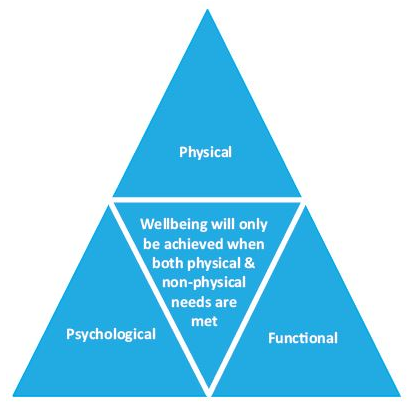Wellbeing and the role of a facility manager
Contents |
[edit] Introduction
To ensure and maintain a ‘well’ workplace, Facility Managers (FMs) can play a vital role. The indoor environment should be a safe place that not only responds to basic human physical needs, but also meets occupants’ psychological needs, enhances their abilities and aids their happiness.
As FMs are trying to optimise energy performance of their buildings, in terms of installed services and building fabric, it is essential for them to also consider how they can help the occupants to better control and spend their human energy.
A ‘well’ workplace is the one that helps the workforce to thrive and happily perform to their optimum ability. To achieve and maintain such an environment, the FMs of a building should formulate a strategy to regularly monitor and evaluate the ‘wellness’ of the building (see Figure 1).
The concept and terminology of wellbeing is not new, however in the last few years we have been witnessing a rapidly-growing interest towards wellbeing. This interest includes understanding and monitoring the factors that can affect occupant wellbeing and productivity in a workplace.
From an organisational management point of view, wellbeing is a major factor in work quality and productivity and, therefore, business success. Poor performing workplaces can affect organisations’ ability to attract and retain the talent they need to succeed. It is, therefore, essential that wellbeing is properly managed in workplaces.
Like anything else, to manage wellbeing in a workplace, it must be measured. This is not an easy task given the intangible nature of wellbeing. It might be argued that assessing wellbeing in a workplace can be tricky and misleading as non-workplace-related life events can also pose threats on individuals’ health.
Although this argument is partly true and sometimes it is impossible to tackle stressful matters at their source, a ‘well’ workplace can act as buffers to the negative effects of those adverse experiences. Existing knowledge also proposes that workplace quality can significantly affect building occupant wellbeing and productivity. In other words, occupant wellbeing can be assessed indirectly by monitoring the different indoor environmental factors of a workplace.
[edit] Physical factors
If building occupants are not physically comfortable they are less likely to be able to concentrate on their tasks and work effectively. This is known as ‘presenteeism’ i.e. when an employee is present at work but cannot perform efficiently. Presenteeism, as well as absenteeism, can cost organisations significantly.
The role of FMs in providing a comfortable indoor environment is broadly recognised. FMs are normally the first point of contact when it comes to issues related to physical comfort as they are usually responsible for managing indoor environmental factors such as:
So, FMs should maintain a physically comfortable environment for the occupants. Providing a platform where the occupants can log/report their wellbeing-related complaints can help the FMs to identify the issues and respond to them faster.
[edit] Functional factors
Another indoor environmental factor that can affect occupant wellbeing is space utilisation. FMs should try to better understand the occupants’ type of work, as well as their company’s strategy and direction to create a space to support the needs.
FMs should collaborate with their HR and ICT teams to ensure their buildings are efficient in terms of occupant density, functionality (fitness for purpose), layout, furniture, ICT, and indoor facilities (e.g. restaurant, shower rooms, meeting rooms with video conferencing facilities, etc.).
In addition to personal workstations, providing designated areas for collaboration, contemplation and formal and informal meetings can significantly contribute towards workplace wellness.
[edit] Psychological factors
Until recently, FMs’ responsibilities were focused on managing HVAC, lighting systems, furniture and other physical factors that affect workplace safety and quality. The FM’s role has now taken on another level. FMs should focus not only on physical factors of buildings but also the psychological experience of people in the workplace.
Many factors in a workplace can influence occupant psychological wellness. Access to nature, for example, is thought to have benefits for wellbeing. Growing evidence suggests that access to nature, outside view and indoor greenery reduces mental fatigue and improves individuals’ ability to deal with stress and other work/life-related issues.
This article was originally published here by BSRIA in March 2017. It was written by Dr. Michelle Agha-Hossein, Sustainable Building Consultant, BSRIA Sustainable Construction Group.
--BSRIA
[edit] Related articles on Designing Buildings Wiki
Featured articles and news
Do you take the lead in a circular construction economy?
Help us develop and expand this wiki as a resource for academia and industry alike.
Warm Homes Plan Workforce Taskforce
Risks of undermining UK’s energy transition due to lack of electrotechnical industry representation, says ECA.
Cost Optimal Domestic Electrification CODE
Modelling retrofits only on costs that directly impact the consumer: upfront cost of equipment, energy costs and maintenance costs.
The Warm Homes Plan details released
What's new and what is not, with industry reactions.
Could AI and VR cause an increase the value of heritage?
The Orange book: 2026 Amendment 4 to BS 7671:2018
ECA welcomes IET and BSI content sign off.
How neural technologies could transform the design future
Enhancing legacy parametric engines, offering novel ways to explore solutions and generate geometry.
Key AI related terms to be aware of
With explanations from the UK government and other bodies.
From QS to further education teacher
Applying real world skills with the next generation.
A guide on how children can use LEGO to mirror real engineering processes.
Data infrastructure for next-generation materials science
Research Data Express to automate data processing and create AI-ready datasets for materials research.
Wired for the Future with ECA; powering skills and progress
ECA South Wales Business Day 2025, a day to remember.
AI for the conservation professional
A level of sophistication previously reserved for science fiction.
Biomass harvested in cycles of less than ten years.
An interview with the new CIAT President
Usman Yaqub BSc (Hons) PCIAT MFPWS.
Cost benefit model report of building safety regime in Wales
Proposed policy option costs for design and construction stage of the new building safety regime in Wales.
Do you receive our free biweekly newsletter?
If not you can sign up to receive it in your mailbox here.

























